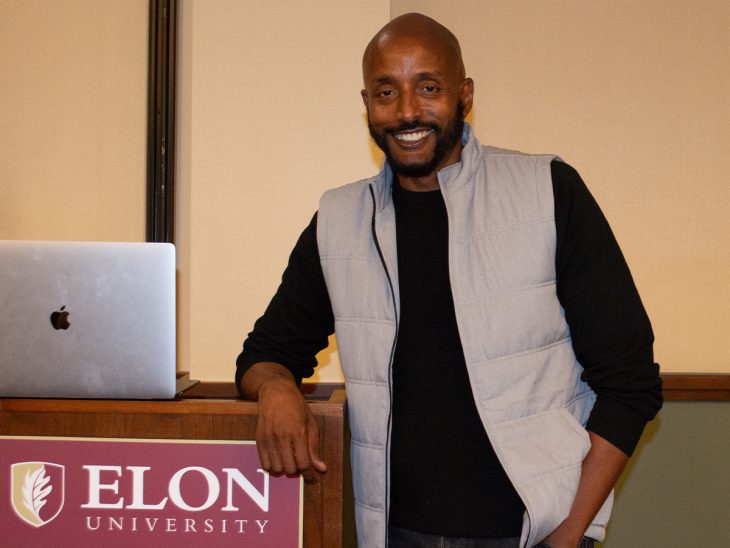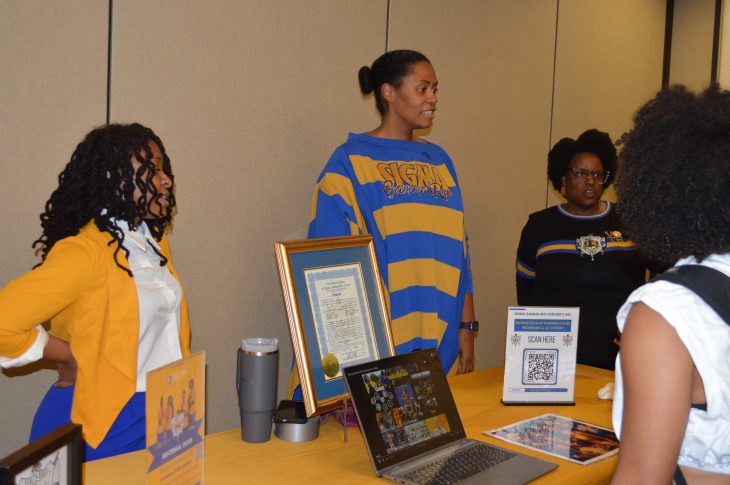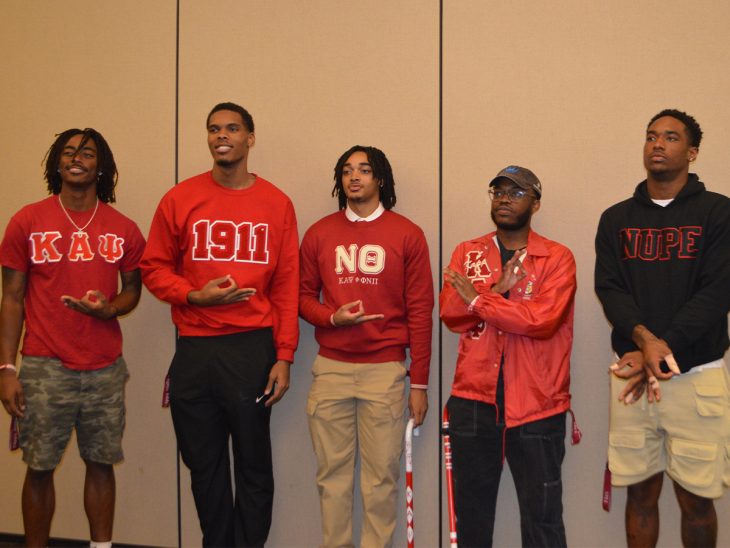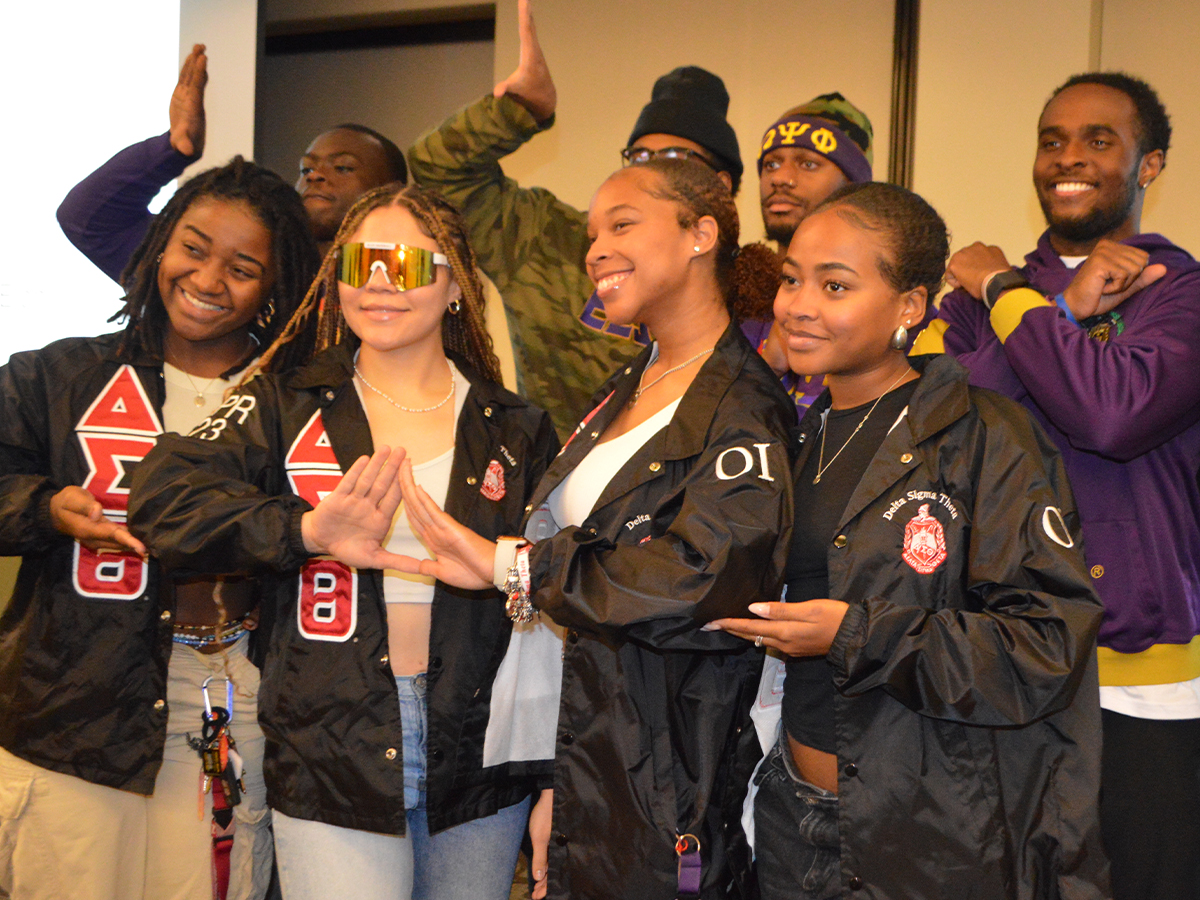Elon’s National Pan-Hellenic Council invited speaker Rasheed Ali Cromwell to discuss the misconceptions around Black Greek organizations during "All We Do Is Step, Stroll and Hop?" on Oct. 29.
Camryn Houston ‘25, a member of the Omicron Iota chapter of Delta Sigma Theta Sorority, Inc., says some people may have the wrong idea about Black Greek-lettered organizations, also known as the Divine Nine.
“It’s disappointing because the misconceptions can deter people from joining our sisterhood or other historically Black Greek organizations that are solely founded in service and sisterhood,” said Houston.
Houston attended “All We Do is Step, Stroll and Hop?” an educational dialogue hosted by the National Pan Hellenic Council at Lakeside on Oct. 29 with speaker Rasheed Ali Cromwell, founder and president of the Harbor Institute. Cromwell discussed the history of the Divine Nine and how they are more than media coverage showing stepping or strolling performances.

Cromwell used the example of the 2007 film “Stomp the Yard,” where the main character attends a Historically Black College or University (HBCU) and performs with his Black fraternity to avoid juvenile hall. Attendees said that when they first watched this movie, they believed there was an expectation to know how to step to be allowed into a Black Greek organization. Participants were asked to research a sorority or fraternity that they are not associated with and see the commonalities in what the media portrays. Strolling, probates and step shows were the frequent first results when attendees searched any of the Divine Nine.
“A perspective I had coming into college was that Black Greek organizations were more for friendships and relationships amongst each other instead of it being something bigger for the community,” said Nevaeh Kimmie ‘28.
Lifelong experience
Cromwell discussed the Jim Crow era in American history where Black students were entering desegregated universities after years of discriminating laws that prevented them from attending higher education with white students. Like white students, Black students wanted spaces where they could be safe and celebrate each other’s achievements, hence the creation of the Divine Nine. Delta Sigma Theta Sorority, Inc. was the first Black Greek-lettered organization on Elon’s campus, chartered on May 9, 1981.
“They needed support on campus, but if it was separate but equal, we needed the same service and support in the community, so then community service became paramount to the Black Greek organizations,” Cromwell said.

The Divine Nine’s purpose is to encourage academic success for its members, uplift its community through service and leverage a long-lasting network to support its alumni. There are almost 3 million active NPHC members across the world.
“Divine Nine is different from Black Student Union, Black Student Association, or playing a sport because when you graduate from Elon, that terminates. But your membership (in the Divine Nine) is a lifelong experience,” Cromwell said.
Cromwell described what the media does not show, including the cultural traditions and operational differences, mainly based on African tradition. Yard Shows, though over-popularized by the media, feature synchronized dances with complex foot works and chanting stemming from African call-and-response rituals and more relaxed dances with fluid movement, showcasing an organization’s unique style.
Divine Nine organizations also proudly display their Greek letters through customized clothing, jewelry and unique hand gestures. All these traditions are meant to promote unity and recognition within Black Greek organizations so generations and alumni can have consistent connections.
Elon’s Divine Nine welcomes
Turkesshia Moore is an anti-basileus (vice-president) of Sigma Gamma Rho’s Delta Sigma Sigma alumnae chapter in Greensboro. Her goal is to reactivate an Elon chapter; she attended the event with her sisters to share Sigma Gamma Rho’s pursuit of sisterhood, scholarship and service.

Baxter Glover, grand polemarch (president) of Kappa Alpha Psi, mentioned that they want to welcome first-year students and interested members by hosting Kappa Week, an annual series of Kappa-related events during Homecoming Week.
“We want to make them feel a sense of community and brotherhood, which is what we are all about,” said Kendall Campbell ‘27, a member of Kappa Alpha Psi.
“There is a fear from young men in joining based on an intimidation factor due to all the strolling and hoping. But if you walk up and talk to any member in any fraternity like I did before I joined a fraternity, you realize you can learn a lot,” said Austin Williams ‘26, a member of Kappa Alpha Psi.
The event sparked a commitment among attendees to reshape the narrative surrounding the Divine Nine, focusing on highlighting the rich and undervalued history of their organizations and solidifying the promise of service, academic success and loyalty to their brothers and sisters.



